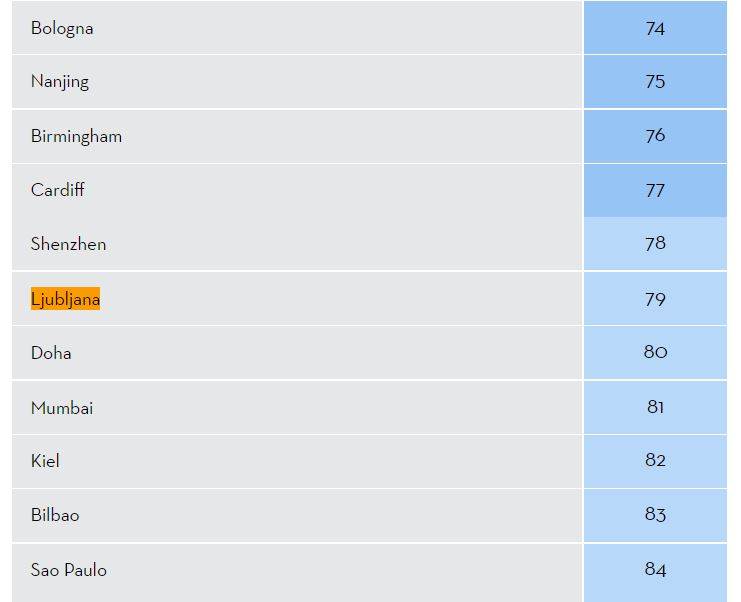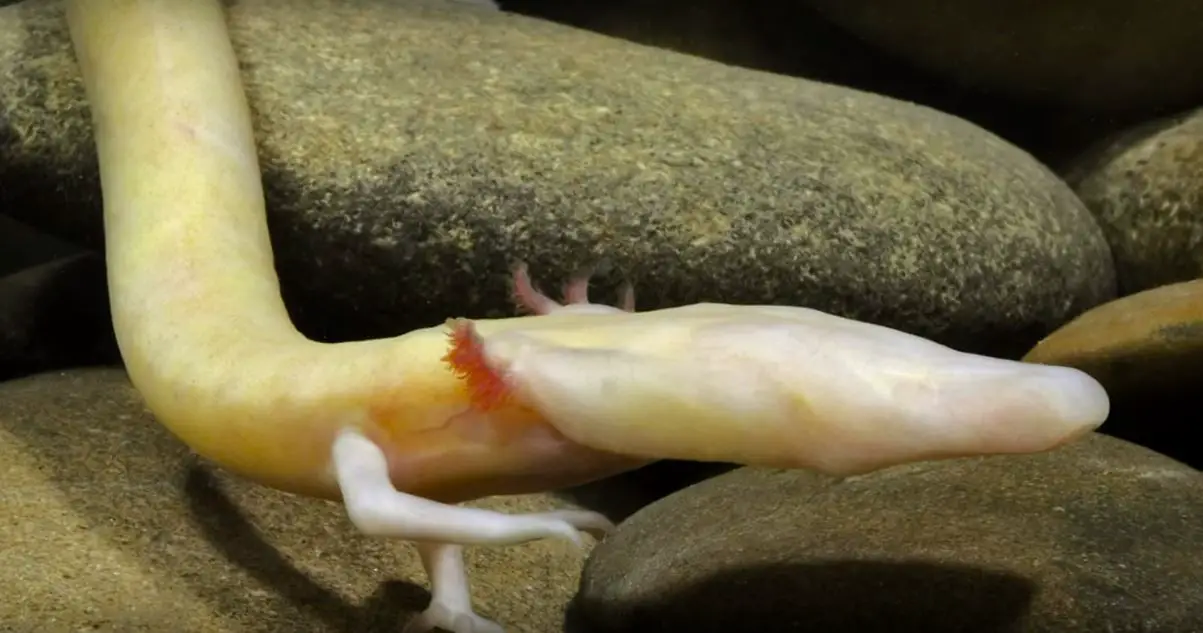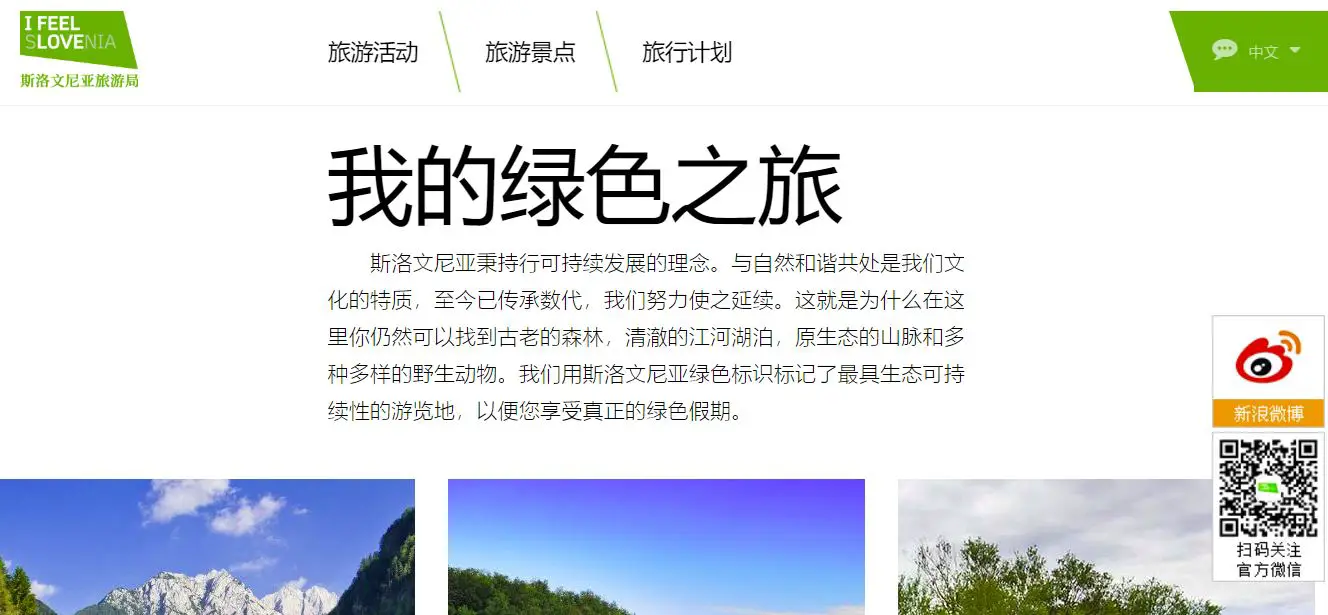News
According to Delo.si the Administrative Unit (Uprana enota, UE) of Ljubljana is planning a reorganization of work this summer at its Tobačna 5 branch in Ljubljana, which has seen increasing complaints due to long queues for foreigners sorting out their paperwork to live and work in the country.
Delo.si quotes Bojan Babič, who from October 2019 has been in charge of UE Ljubljana, saying that the departments for foreigners and Slovenian citizens at Tobačna will be separated. At the department where Slovene citizens file different applications and edit personal and other documents, they will change the current system of work by removing the walls that are separating different offices and their waiting rooms, and introduce a unified system of work at the windows, with a single waiting room for all clients.
For foreigners, they will increase the number of receptionists and set up separate offices – for first time applications, for completing and picking up the documents, etc. According to Babič, the aim is to establish a system which would allow foreigners to visit the premises twice at most instead of the current multiple visits, while first-time applications could also be filed at other branches of the UE in Ljubljana.
STA, 24 January 2020 - The EU's Court of Justice will announce on 31 January whether it will admit Slovenia's suit against Croatia over the latter's failure to implement the 2017 border arbitration award, according to a posting on the court's website.
In early December 2019, the court's Advocate General Priit Pikamäe proposed to the court to rule the case inadmissible, which came as a surprise to many in Slovenia.
However, while many agreed the opinion did not bode well for the fate of the procedure, the opinion does not prejudge the court's final decision on admissibility.
Slovenia, arguing Croatia infringes several articles of EU law, brought its case to the EU court in July 2018, after the European Commission refused to do do.
In his no-binding opinion, Pikamäe argued that "the infringements of EU law of which Slovenia accuses Croatia are ancillary to the issue of determining the boundary between those two states, which is a matter of public international law".
His understanding is that since the award has not been implemented, the border between Slovenia and Croatia has not been set, which is why Croatia could not be accused of violating relevant provisions of EU law.
The advocate general interpreted Slovenia's suit as an attempt to force Croatia to implement the border decision, which he argued does not fall under the EU's jurisdiction.
If the court agrees with Pikamäe's opinion, the procedure will stop there. If it admits the case fully or partly, the case will be further processed, followed by another opinion by the advocate general and the final ruling.
Slovenia and Croatia signed the arbitration agreement in November 2009, agreeing to task an international tribunal with settling the border after years of futile attempts to determine the course of the border in the aftermath of the break-up of Yugoslavia in 1991.
STA, 23 January 2020 - Slovenian President Borut Pahor laid a wreath at Yad Vashem Holocaust remembrance centre in Jerusalem on Thursday as he attended the World Holocaust Forum marking the 75th anniversary of the liberation of the Auschwitz-Birkenau death camp.
On the sidelines of his two-day visit to Jerusalem, Pahor repeated his position on the quashing of the 1946 conviction of Leon Rupnik for collaboration with the Nazis during Second World War.
According to his office, Pahor explained his position on Rupnik, the head of the provisional government of the Nazi-occupied Ljubljana, to Israelis, including Miriam Steiner-Aviezer of Yad Vashem.
He told them that he never commented on concrete decisions of the independent institutions of the rule of law. But he did add that in his view future generations too would deem the general's swearing to Hitler, his collaboration with the occupying forces and his being an anti-Semite as abject acts.
The ceremony today was addressed by Israeli President Reuven Rivlin, Russian President Vladimir Putin and French President Emmanuel Macron with their main message being that the Holocaust should not be forgotten and even that all must be done to prevent it from ever repeating again.
The memorial concluded with Holocaust survivors Rose Moskowitz from the US and Colette Avital, the head of the Center of Organizations of Holocaust Survivors, lighting a menorah.
This was followed by the invited world leaders laying wreaths at Warsaw Ghetto Square in Yad Vashem, among them Pahor.
Predsednik Republike Slovenije Borut Pahor se je danes udeležil osrednje slovesnosti Foruma voditeljev ob mednarodnem dnevu spomina na holokavst v Jeruzalemu. #UnitedinMemory75 pic.twitter.com/xdvTXLhich
— Borut Pahor (@BorutPahor) January 23, 2020
Predsednik Pahor se je pred začetkom slovesnosti srečal z mnogimi svetovnimi voditelji. pic.twitter.com/33F4ibs6ya
— Borut Pahor (@BorutPahor) January 23, 2020
Spominska slovesnost se je zaključila s polaganjem vencev k Spomeniku upora Varšavskega geta, ki so jih položili povabljeni državniki, med njimi predsednik Pahor. #UnitedinMemory75 pic.twitter.com/bdnhS19h8r
— Borut Pahor (@BorutPahor) January 23, 2020
Pahor held several bilateral meetings ahead of the ceremony, including with his Austrian counterpart Alexander van der Bellen, Hungary's Janos Ader, Italy's Sergio Mattarella, Portugal's Marcelo Rebelo de Sousa and Slovakia's Zuzana Čaputova.
In brief meetings he also congratulated European Commission President Ursula Von der Leyen, President of the European Council Charles Michel and President of the European Parliament David Sassoli on their appointments.
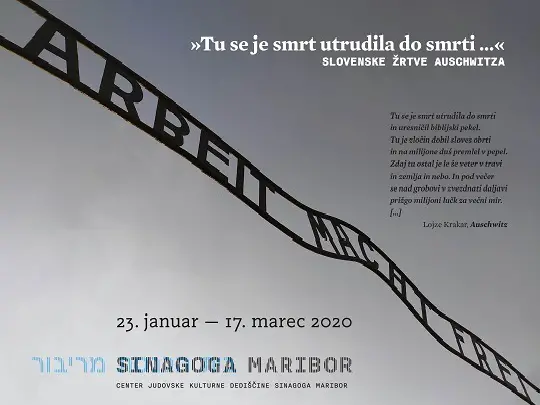
Exhibition pays tribute to Slovenians in Auschwitz
STA, 23 January 2020 - An exhibition launched in Maribor on Thursday tells about the hardship of some 2,300 people from Slovenia who were deported to the Auschwitz concentration camp, some 1,300 never to return.
The documentary exhibition Here Is Where Death Worked Itself to Death ... was launched at the Maribor Synagogue as part of the events commemorating International Holocaust Remembrance Day and the 75th anniversary of the liberation of the Auschwitz-Birkenau death camp.
Among the 2,300 deported to the camp from Slovenia, 350 were Jews, at least 78 were Roma, and at least one was a member of Jehovah's Witnesses from Slovenia.
"For around 1,300 of them, Auschwitz is the place of death, which means it's one of the largest cemeteries of the Slovenian victims of World War II," said Boris Hajdinjak, the author of the exhibition.
He noted that one third of the victims were women, while the most tragic fate befell the Roma. "None of them would survive the war. Most of those identified were deported from Dolenjska", south-eastern Slovenia, Hajdinjak told the STA.
People were deported from all parts of the country. "No region was excluded. Interned in Auschwitz were the Logar sisters, after whom the Logar Valley (N) is named," he said, offering one example.
On display until 17 March, the exhibition tells personal stories of various groups and types of people who ended up in the camp, Hajdinjak's way to show that nobody was spared.
The exhibition is part of the project Shoah - Let Us Remember, a series of events held annually across the country to mark International Holocaust Remembrance Day.
The project's honorary sponsor is Culture Minister Zoran Poznič, who was unable to attend the ceremony in Maribor.
Speaking on his behalf, State Secretary Tanja Kerševan Smokvina said that remembering the Holocaust was particularly important today in the face of new kinds of hatred.
"New concentration camps are at Europe's doors, children are drowning in our seas and rivers, while the Holocaust denial, attempts at historical revisionism, xenophobia and hatred are on the increase."
The official urged everyone to ask themselves what each can do to alleviate and turn around those trends.
She noted that Minister Poznič is in talks with his counterparts from the countries of the former Yugoslavia to renovate what used to be the Yugoslav exhibition pavilion at the Auschwitz-Birkenau remembrance centre to mount a joint exhibition there as "a lasting memory and above all a reminder".
The main ceremony marking International Holocaust Remembrance Day will be held in Lendava on 30 January with President Borut Pahor as the keynote speaker.
STA, 23 January 2020 - Slovenia is slowly falling behind in the global race for talent. It ranks 31st in the latest Global Talent Competitiveness Index (GTCI), down two spots from the year before. When the index was first introduced in 2013, it placed 25th.
The survey, by INSEAD business school, temping agency Adecco and Google, ranks countries by their ability to enable, attract, grow and retain talent. It also looks at vocational skills and global knowledge skills.
Slovenia's best marks were for vocational and knowledge skills and for its ability to retain talent, categories in which it places 27th among 125 countries. But its ability to attract talent is lacklustre, earning it 47th place in this category.
Switzerland remains at the top of the rankings, followed by the US, Singapore, Sweden and Denmark.
Among Slovenia's neighbouring countries, only Austria ranks higher, at 17th.
The study also ranks 155 cities by their attractiveness to talent. New York, London and Singapore are at the top, with Ljubljana at 79th, between the Chinese powerhouse Shenzen and the Qatari capital Doha.
Screenshot gtcistudy.com
You see more about the index here
STA, 23 January 2020 - Adria Airways operating licences were auctioned off on Thursday to Air Adriatic, a newly established company owned by Slovenian produce importer Izet Rastoder, at the asking price of EUR 45,000.
"The auction was successful, the licences were sold at the asking price. There were three bidders. The asking price was accepted and there was no bidding," Adria receiver Janez Pustatičnik told the press.
Apart from Air Adriatic, the registration deposit was paid by Croatian company Komforia, and Dedal Aero, owned by former Adria pilot Dejan Slodej.
The buyer has three days to sign the contract and then pay the agreed sum within a month in order to acquire the rights that come with the licences.
However, in order to be able to use the licences the buyer will have to take certain steps to meet the criteria Adria met before its licence was revoked and the receivership launched, Pustatičnik explained.
Adria has some other assets, including its registered brand and some buildings, but the operating licences were considered some of the most valuable assets.
"This had to be sold as soon as possible, so the buyer can take all the necessary steps to be able to use the licences. The Civil Aviation Agency has extended this deadline until the end of September."
The buyer will be able to use all the benefits of Adria's membership in various organisations, and rent the remaining infrastructure of the former flag carrier until it is sold. This includes the brand name, building and equipment.
"The buyer cannot land anywhere for the time being because it does not fly. First, it must take all the necessary steps. The deadline for reporting to Germany whether the summer season will be carried out is 31 January."
After Pustatičnik examines the 2,800 claims reported, Adria's brand name will be put up for sale as well.
Following Adria's receivership in October, several potential buyers expressed interest in the group's licences, including its air operator's certificate (AOC), as well as its flight school.
Only a week ago, it was reported that investors linked to the Russian state-owned aircraft manufacturer Sukhoi had also confirmed their interest, but they did not show up for the auction.
Slovenia's former flag carrier Adria Airways, which was sold to the German financial fund 4K in 2016, went into receivership last autumn after years of financial difficulties.
After its collapse, the government considered founding a new carrier to preserve Slovenia's connectivity with the world but this option was ultimately dismissed as economically unfeasible.
However, the government is reportedly still looking for a way to have Slovenia better connected with four major European hubs - Frankfurt, Munich, Zurich and Brussels - through regional air carriers.
A solution is being draw up by the Bank Asset Management Company (BAMC) and is expected to be presented at the beginning of this year.
Pustatičnik refused to speculate on why the state did not bid for the licences today, noting only that BAMC officials had been collecting information about Adria in October and November.
The representative of Air Adriatic would not comment on the auction, while Adria's former pilot Slodej, who also took part in the auction, said Slovenia could have a profitable airline. "I hope the buyers know enough about the business that a success story will now unfold," he said.
He thinks the market is big enough but that the airline should have a different business model than Adria had.
STA, 23 January 2020- The four-day Biathlon World Cup meet in Slovenia's Pokljuka started on Thursday with the men's 20km individual event, with Johannes Thingnes Boe of Norway emerging as the winner, while Jakov Fak was the best Slovenian competitor in 12th place.
The Norwegian was perfect in shooting, finishing 11.4 seconds ahead of Martin Fourcade of France, who kept his overall lead in the World Cup. Third place went to another Frenchman, Fabien Claude (+25.6).
Slovenia's best biathlete Jakov Fak finished 2 minutes and 20.2 seconds behind the winner for the 12th place, as he missed one target in the process. The second best Slovenia was Rok Tršan (+4:26.1) in 31st place.
Boe, who was absent from the World Cup for four weeks after becoming a father, said he "started slower than usual today" and "spent some more time on the shooting range, but everything went well and I'm happy."
He added that Fourcade had rang up four wins in the meantime, which made it difficult for him to grab the overall win. "This is why the world championship is the primary goal."
Fak, who kept his 15th overall place in the World Cup, said that "missing the last shot was very painful" as he had some technical problems. "It will be hard to climb higher this season, and today I tried to make a better result, but I couldn't."
The races at the plateau within the Triglav National Park continue on Friday with the women's 15km individual event.
Saturday is reserved for the single mixed relay and the 4x7.5km mixed relay, with the meet wrapping up on Sunday with the men's 15km mass start and a women's 12.5km mass start competitions.
Visit Biathlon World Cup in Pokljuka: January 22-26, 2020
* Results of the men's 20km event and overall standings: 1 Johannes Thingnes Boe (NOR) 47:54.3 (0) 2 Martin Fourcade (FRA) + 11.4 (0) 3 Fabien Claude (FRA) 25.6 (0) 4 Phillip Nawrath (GER) 36.7 (0) 5 Johannes Dale (NOR) 1:02.4 (1) 6 Tarjei Boe (NOR) 1:26.4 (1) 7 Quentin Fillon Maillet (FRA) 1:28.5 (2) 8 Johannes Kühn (GER) 1:41.8 (1) 9 Vetle Sjaastad Christiansen (NOR) 1:56.1 (1) 10 Benedikt Doll (GER) 2:06.5 (2) ... 12 Jakov Fak (SLO) 2:20.2 (1) 31 Rok Tršan (SLO) 4:26.1 (1) 34 Klemen Bauer (SLO) 4:52.3 (3) 46 Miha Dovžan (SLO) 5:32.5 (5) - Overall World Cup standings (12 of 24 events): 1 Martin Fourcade (FRA) 561 pts 2 Quentin Fillon Maillet (FRA) 472 3 Simon Desthieux (FRA) 455 4 Johannes Thingnes Boe (NOR) 434 5 Tarjei Boe (NOR) 429 6 Alexander Loginov (RUS) 415 7 Emilien Jacquelin (FRA) 389 8 Johannes Dale (NOR) 362 9 Benedikt Doll (GER) 361 10 Erlend Bjoentegaard (NOR) 331
Check the date at the top of the page, and you can find all the "morning headlines" stories here. You can also follow us on Facebook and get all the news in your feed.
A schedule of all the main events involving Slovenia this week can be found here
This summary is provided by the STA:
Produce importer Rastoder buys Adria Airways operating licences
LJUBLJANA - Adria Airways operating licences were auctioned off to Air Adriatic, a newly established company owned by Slovenian produce importer and real estate developer Izet Rastoder, at the asking price of EUR 45,000. Receiver Janez Pustatičnik said that there were three bidders, "the asking price was accepted and there was no bidding". Apart from Air Adriatic, the registration deposit was paid by Croatian company Komforia, and Dedal Aero, owned by former Adria pilot Dejan Slodej.
Foreign minister urges Slovenia's return to Iraq
LJUBLJNA - Foreign Minister Miro Cerar urged the Defence Ministry to send Slovenia's six soldiers back to Iraq as soon as possible, or else the country's reputation will suffer. The Defence Ministry responded that the soldiers are ready to go back "as planned". Earlier, it was said they would return no later than 1 February. Cerar addressed a letter to Defence Minister Karl Erjavec to brief him on the allies' assessment of the situation in the Middle East after he attended Monday's session of EU foreign ministers in Brussels. Given the current security situation and the presence of other allies, Cerar urged for the soldiers to promptly return the Erbil air base to preserve Slovenia's credibility, the Foreign Ministry said in a release.
Pahor honours Holocaust victims in Jerusalem
JERUSALEM, Israel - Slovenian President Borut Pahor laid a wreath at Yad Vashem Holocaust remembrance centre in Jerusalem as he attended the World Holocaust Forum marking the 75th anniversary of the liberation of the Auschwitz-Birkenau death camp. The ceremony today was addressed by Israeli President Reuven Rivlin, Russian President Vladimir Putin and French President Emmanuel Macron with their main message being that the Holocaust should not be forgotten and even that all must be done to prevent it from ever repeating again. This was followed by the invited world leaders laying wreaths at Warsaw Ghetto Square in Yad Vashem, among them Pahor.
Pahor, Mattarella discuss EU future
JERUSALEM, Israel - President Borut Pahor held talks with his Italian counterpart Sergio Matterella focusing on the future of the EU and current issues that the bloc faces. The discussion touched on Brexit, the Western Balkans as well as migrations and the need for joint EU action in this field. The presidents said broader dialogue was needed on issues that Europe faces, Pahor's office said after the talks, held on the margins of a memorial in Jerusalem marking the 75th anniversary of the liberation of the Nazi concentration camp Auschwitz-Birkenau.
Slovenia making no progress in corruption perceptions index
LJUBLJANA - Slovenia ranked 35th among 180 countries in Transparency International's (TI) Corruption Perceptions Index (CPI) rankings for 2019, up one spot from the year before. It scored 60 out of 100 points, which is level with 2018. The country has thus made no major progress since 2012, TI Slovenia said, adding that the country's score is bellow the EU and OECD averages of 64 and 68 points, respectively. Moreover, there is an absence of any systemic measures to make the fight against corruption in Slovenia more efficient, TI Slovenia said.
Slovenia falling behind in global race for talent
PARIS, France - Slovenia is slowly falling behind in the global race for talent. It ranks 31st in the latest Global Talent Competitiveness Index (GTCI), down two spots from the year before. When the index was first introduced in 2013, it placed 25th. The survey, by INSEAD business school, temping agency Adecco and Google, ranks countries by their ability to enable, attract, grow and retain talent. It also looks at vocational skills and global knowledge skills. Slovenia's best marks were for vocational and knowledge skills and for its ability to retain talent, categories in which it places 27th among 125 countries. But its ability to attract talent is lacklustre, earning it 47th place in this category.
Slovenia seeking UNESCO listing of Plečnik's Ljubljana works
LJUBLJANA - The government decided that Slovenia will formally seek a UNESCO listing of famed architect Jože Plečnik's (1872-1952) works in the capital Ljubljana after an earlier joint bid with the Czech Republic was abandoned. All of Plečnik's major works in Ljubljana will be nominated for the world heritage list, except for the dilapidated Bežigrad Stadium. The nomination covers works he had completed during both world wars: the Ljubljanica embankment, Vegova Street, the National and University Library, Congress Square and the surrounding park, the archaeological park around the remains of the Roman defence wall, Žale Cemetery and two churches, St. Michael's south of Ljubljana and St Francis Asisi in the Šiška borough.
US urges Slovenia pick trusted vendors of 5G
LJUBLJANA - Robert Strayer, the deputy assistant secretary for cyber and international communications and information policy, visited Slovenia to raise concerns about the security aspect in deciding which providers of 5G technology to chose, advising it to look at where the provider is headquartered. He noted the importance of adopting appropriate security measures in order to protect sensitive data, and that the company that provides 5G wireless technology must be resident in an environment where there is rule of law, due process and independent judiciary.
Consumer confidence down 10 pp y/y
LJUBLJANA - Consumer confidence in Slovenia improved by 2 percentage points (pp) in January over December, however, considerable deterioration of 10 pp was detected compared to January 2019, the Statistics Office. Compared to a year ago, consumers are far more pessimistic, above all in their expectations for employment (down 20 pp) and the economic situation in the country (14 pp). Moreover, expectations about household finance decreased by 4 pp, whereas expectations about savings were lower by 1 pp.
Norway's Thingnes Boe wins first World Cup event at Pokljuka
POKLJUKA - The four-day Biathlon World Cup meet in Slovenia's Pokljuka started with the men's 20km individual event, with Johannes Thingnes Boe of Norway emerging as the winner, while Jakov Fak was the best Slovenian competitor in 12th place. The Norwegian was perfect in shooting, finishing 11.4 seconds ahead of Martin Fourcade of France, who kept his overall lead in the World Cup. Third place went to another Frenchman, Fabien Claude (+25.6). Slovenia's best biathlete Jakov Fak finished 2 minutes and 20.2 seconds behind the winner for the 12th place, as hi missed one target in the process. The second best Slovenia was Rok Tršan (+4:26.1) in 31st place.
Four waste management companies found guilty of collusion
LJUBLJANA - The Competition Protection Agency established that Surovina, Dinos, Salomon and Recikel colluded to push their rival Interseroh from the Slovenian recycling market to divide the lucrative market among themselves. Salomon, Surovina and Dinos are present on the market for managing packaging waste, which entails collection, separation, transport and treatment. Recikel, Surovina, Dinos and Interseroh are present on the market for organising packaging waste management. The two markets are interconnected, as the companies doing business on the second market buy services from the companies from the first one. The agency established the four companies agreed that Salomon, Surovina and Dinos will stop providing services for Interseroh, a subsidiary of the German ALBA group.
Coronavirus risk level low in Slovenia
LJUBLJANA - The risk of a novel deadly coronavirus appearing in Slovenia has been assessed as relatively low, but Slovenian authorities advised caution when travelling to China, where the virus has spread from. Travel alerts for China, where four cities have been put on lockdown in the wake of the outbreak, were issued by the Slovenian Foreign Ministry and the National Institute of Pubic Health (NIJZ). Moreover, travellers to China are advised to avoid animals and markets selling animals or animal products such as meat that has not been properly thermally treated.
Visiting Ljubljana? Check out what's on this week, while all our stories on Slovenia, from newest to oldest, are here
If you're learning Slovenian then you can find all our dual texts here
The news that Slovenia is #21 on Bloomberg’s 2020 Innovation Index, with its rise over the last 12 months due to strong patent performance, is a reminder that there’s a lot more to the country than tourism and cultural heritage. Perhaps to the surprise of visitors who only make it to Bled and Ljubljana Old Town, Slovenia is a modern country with a broad-based economy, its position strengthened by the many research projects its scientists are involved in.
In case you missed them the first time round, here’s a brief review of some of the developments and discoveries we’ve noted on TSN over the last year or so.
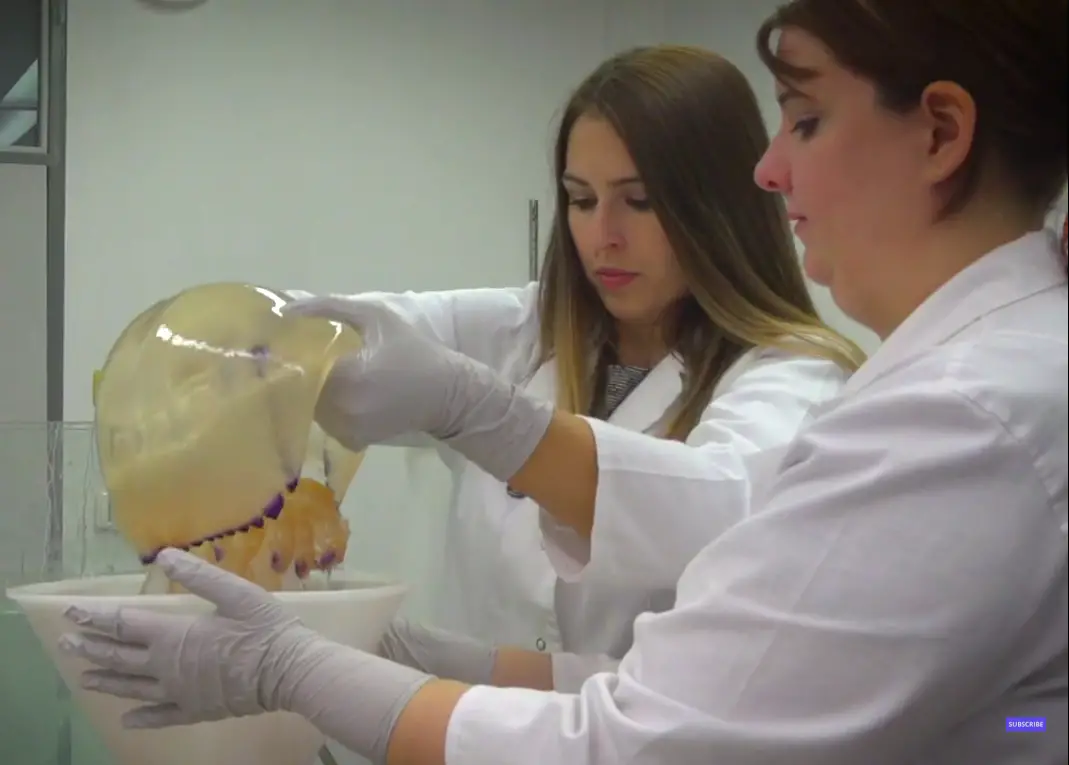
Source: YouTube
Renewable energy, better batteries and cleaner oceans
A Slovene team has developed a tandem solar cell that transforms solar energy into electricity in the most efficient manner seen to date, an important step towards photovoltaics becoming more competitive in power production.
The move to renewable energy will require new kinds of devices to store the power produced, and, Slovenian researchers are working on batteries that could end the need to mine certain minerals outside of Europe, as well as on aluminium batteries that have a greater capacity that current ones, and also contain less damaging and more readily available materials.
However, no matter what developments there are in terms of renewables, climate change is already having an impact on the environment. One sign of this is the proliferation of jellyfish blooms in the Adriatic and elsewhere. Such infestations are inspiring researchers to look for new ways to use an oversupply of jellyfish – as food, as fertilizer, and, in Slovene/Israeli project, as a way to remove microplastics from the oceans. To achieve this the project is developing a filter that makes use of jellyfish mucus to trap the tiny pieces of pollution.

AI, quantum computers and a new form of matter
Of course, the future will be dominated by computers that are becoming ever faster, smaller and smarter, and here Slovenia also plays a part. For one, UNESCO is sponsoring a global AI research centre that will be based in Ljubljana. For another the Jožef Stefan Institute (JSI - Institut "Jozef Stefan”) and a team from Switzerland have confirmed the existence of two kinds of atypical anyon quasiparticles in a special kind of quantum magnet, Ruthenium(III) chloride – said to be a key step towards the creation of a topological quantum computer. The JSI is the country’s leading research centre, and last year researchers working there discovered an entirely new kind of matter based on “electron jamming”, one that as yet cannot be understood with existing physics.
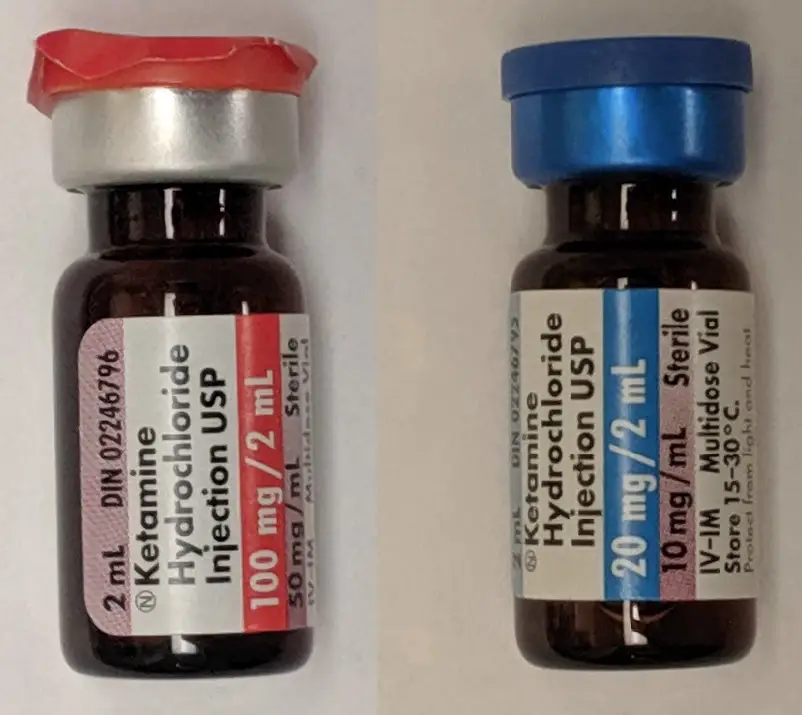
Source: Wikimedia Doc James CC-by-SA-4.0
Ketamine, stem cells and gene-editing
Turning to the life sciences, researchers at the Ljubljana Faculty of Medicine, the biomedical centre Celica and the National Institute of Chemistry, discovered a new molecular mechanism of action in ketamine that has potential for the development of fast-acting antidepressants. While a team involving Slovenians also published a ground-breaking cell differentiation paper that could help revolutionise personalised regenerative medicine and the use of stem cells. Another cutting edge cell technology is the CRISPR gene-editing technique, with researchers at the JSI working on new applications for this.
Source: YouTube
The mysteries of the human fish, dolphin and honey bee
Another medical discovery, one that draws on one of the country’s most famous animals, is the decoding of the olm’s genome, with this creature perhaps better known as the “human fish” or proteus. Among the olm’s remarkable attributes are the ability to live up to 100 years, to survive (and thrive) for long periods without food, to overeat with damage to its organs, and regenerate lost limbs.
Moving from the karst to the coast, a team based in Piran watched the dolphins in the bay and learned that they share the area based on time, not space. Finally, the humble bumble bee, one of the world’s most important pollinators and another icon of Slovenia (in the form of the Carniolan Grey), has also attracted the attention of the Jožef Stefan Institute. A team there has applied machine learning to help understand the sounds the bees make, and the importance of temperature for their colonies.
You can find more discoveries, inventions and achievements in our section Made in Slovenia.
This week is Chinese New Year, so what better time to read about the growth of Chinese tourism in Southeastern Europe? Dragon Trail has an interesting article titled “The Southeastern Europe Chinese Tourism Boom”, by Sienna Parulis-Cook. It looks at recent trends in travel from the Middle Kingdom to this part of the world, and the states of the former Yugoslavia in particular.
"My Green Travel" -Slovenia has a Chinese website
It notes that the region has seen some of the world’s highest growth rates for Chinese tourism in recent years, with Montenegro more than doubling its tourism numbers in the first nine months of 2019, while in the first half of the year Slovenia saw 46,032 arrivals and 71,571 overnight stays by Chinese tourists, up by 22.5% and 37.6%, respectively. To put those numbers in context, the entire Chinese outbound tourism market grew by just 12% in 2019.
Two of the most viewed Chinese language videos on Slovenia on YouTube
Why such growth? One reason is the ease of visa-free entry in Serbia and Bosnia-Herzegovina, and the fact that both Croatia and Montenegro allow entry to anyone holding a Schengen visa, while Slovenia is already within the free movement zone. Another is the growing business connections between the region and China, most notably via the Belt & Road Initiative to link Eurasia and Africa, with Southeastern Europe being a key route to Northern Europe.
A third is the growing sophistication of Chinese travellers. While those coming to Slovenia are likely still travelling in groups, they’ve probably already been to the AAA must-see sights and cities in Europe – with Paris now receiving some one million Chinese tourists a year. Lesser known destination are thus the new frontier, and with such travellers are said to be less interested in shopping for top brands in luxury stores than in having experiences in terms of culture and outdoors. And as Ana Špik, who works for the Slovenian Tourist Board, notes, Slovenia is increasingly popular for Chinese pre- and post-wedding photography, so it’s also attracting more couples.
The whole article contains a lot more of interest, on Slovenia and the wider region, and can be read here.
STA, 22 January 2020 - Thirty years to the day, the Slovenian delegation walked out of the 14th Congress of the League of Communists of Yugoslavia in Belgrade, in what participants as well as historians deem one of the key moments in the dissolution of Yugoslavia, one that presaged Slovenia's independence.
The delegates of the League of Communists of Slovenia walked out of the congress on the third day of sessions following the rejection of all of their proposals.
Slovenian representatives had called for more autonomy of party organisations in Yugoslav republics and had several proposals aimed towards greater democratisation of Yugoslavia and decentralisation of the League of Communists.
The remaining delegates reacted to the walkout with applause, laughter or boos, with the Belgrade unit of the national television labelling the move as an ill-advised act of separatism.
Following the walkout, the head of the Croatian delegation Ivica Račan proposed that the congress be suspended until the party organisations of the republics examined the situation and found solutions.
The head of the Serbian League of Communists, the future Serbian President Slobodan Milošević, said that this would constitute a dissolution of the congress and called on the remaining delegates to continue the session.
The congress was suspended in less than a week as it was held without representatives of Slovenia, Croatia and Macedonia, in what many see as the start of the disintegration of the League of Communists of Yugoslavia.
The 30th anniversary of the event was marked with a ceremony on Monday hosted by President Borut Pahor, who was among the almost 120 Slovenian delegates to leave the congress on 22 January 1990.
Sociologist Franci Pivec said that the walkout had effectively ended the congress and practically excluded the "ever present" Central Committee of the party from political developments.
Pivec, who was also among the Slovenian delegates, noted that the exclusion of the the League of Communists of Yugoslavia from the political developments at the time was a major event in the run-up to Slovenia's independence.
A month ahead of the congress, the League of Communists of Slovenia adopted a document in which it "expressed its full programme of independence" and called for more Europe-oriented policies in Yugoslavia.
"We came to Belgrade determined that we are going to Europe with Yugoslavia, or without it, if they don't want to go," said Pivec.
He added that even before the congress, it had been clear that the League of Communists of Yugoslavia was "increasingly identifying itself with political views of a military junta" and "openly opposing democratisation."
Ciril Ribičič, the then president of the League of Communists of Slovenia and head of the Slovenian delegation at the congress, said that the plan was to convince others of the need to reform society and the ruling party.
He believes that leaving the congress was the right decision, as "many who were on the opposing side at the event are now sitting in the waiting room for the EU."
Ribičič admitted that it was not simple to maintain unity about the right moment for the walkout, but the delegates nevertheless had left the congress "united, with heads held high and even more convinced that we are on the right path."
President Pahor said that the walkout did not mean that Slovenian communists "returned to Ljubljana with a clear vision that we want to have a Slovenian state".
But the decision did force them to think about alternatives, while at the same time "weakening the federal authorities, in effect lessening their resistance to the democratic aspirations of Slovenians."
Slovenian leaders had diverging views at the beginning of 1990, but the achieved unity, later confirmed at the independence referendum in December, should nevertheless be seen as something exceptional, Pahor added.
In the run-up to the independence referendum, Slovenia declared economic independence from Yugoslavia in March 1990, and the following months a coalition of centre-right called DEMOS won a majority in the first democratic elections in Slovenia.
Following the decisive referendum in favour of independence on 23 December 1990, Slovenia declared independence on 25 June 1991, which was followed by the Ten-Day War and eventual independence from Yugoslavia.
According to a Statistical Office report, there were 75,991 students enrolled in tertiary education in 2018/19. This is 0.7% less than the year before and the ninth consecutive year in a row that saw a decline in number of students enrolled in higher education. Currently 34.2% fewer students are enrolled in higher education than ten years ago, when there were 115,445 college and university students studying in Slovenia.
While number of students enrolled in the 1st and 2nd Bologna cycles (Bachelors and Masters Programmes) is on decline, the number of doctoral students seems to be rising. Compared to the previous academic year, the number of enrolled students in the 3rd Bologna cycle rose from 2,824 to 3,089, or by 9.4%.
As for field of study, the largest group of students in the 2018/19 academic year were in study programs of engineering, manufacturing and construction (13,974 or 18.4%), followed by business, administration and law (13,784 or 18.1%), and health and social security (10,224 or 13.5 %). In contrast, the fewest students were enrolled in the fields of agriculture, forestry, fisheries and veterinary medicine (2,320 or 3.1%) and information and communication technologies (3,842 or 5.1%).

For more information on this data, please click here.


